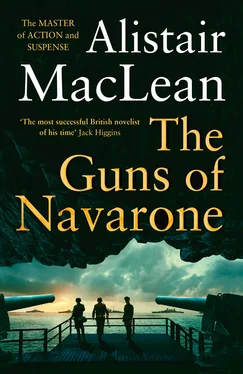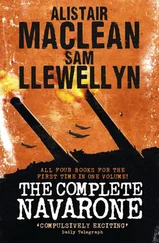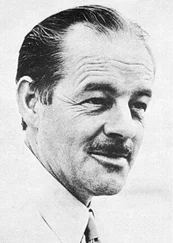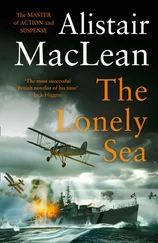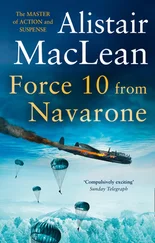‘That’s Cyprus, sir.’ The gunner grinned. ‘You can just see Mount Olympus on the horizon. Nearly always, going to Castelrosso, we fly a big dog-leg over Cyprus. It’s to escape observation, sir; and it takes us well clear of Rhodes.’
‘To escape observation, he says!’ The heavy transatlantic drawl came from the bucket-seat diagonally across the passage: the speaker was lying collapsed – there was no other word for it – in his seat, the bony knees topping the level of the chin by several inches. ‘My Gawd! To escape observation!’ he repeated in awed wonder. ‘Dog-legs over Cyprus. Twenty miles out from Alex by launch so that nobody ashore can see us takin’ off by plane. And then what?’ He raised himself painfully in his seat, eased an eyebrow over the bottom of the window, then fell back again, visibly exhausted by the effort. ‘And then what? Then they pack us into an old crate that’s painted the whitest white you ever saw guaranteed visible to a blind man at a hundred miles – ‘specially now that it’s gettin’ dark.’
‘It keeps the heat out,’ the young gunner said defensively.
‘The heat doesn’t worry me, son.’ The drawl was tireder, more lugubrious than ever. ‘I like the heat. What I don’t like are them nasty cannon shells and bullets that can ventilate a man in all the wrong places.’ He slid his spine another impossible inch down the seat, closed his eyes wearily and seemed asleep in a moment.
The young gunner shook his head admiringly and smiled at Mallory.
‘Worried to hell, isn’t he, sir?’
Mallory laughed and watched the boy disappear for’ard into the control cabin. He sipped his coffee slowly, looked again at the sleeping figure across the passage. The blissful unconcern was magnificent: Corporal Dusty Miller of the United States, and more recently of the Long Range Desert Force, would be a good man to have around.
He looked round at the others and nodded to himself in satisfaction. They would all be good men to have around. Eighteen months in Crete had developed in him an unerring sense for assessing a man’s capacity for survival in the peculiar kind of irregular warfare in which he himself had been so long engaged. Offhand he’d have taken long odds on the capacity of these four to survive. In the matter of picking an outstanding team Captain Jensen, he reckoned, had done him proud. He didn’t know them all yet – not personally. But he was intimately acquainted with the exhaustive dossier that Jensen held on each one of them. These were reassuring, to say the least.
Or was there perhaps a slight question mark against Stevens? Mallory wondered, looking across the passage at the fair-haired, boyish figure gazing out eagerly beneath the gleaming white wing of the Sunderland. Lieutenant Andy Stevens, RNVR, had been chosen for this assignment for three reasons. He would navigate the craft that was to take them to Navarone: he was a first-class Alpinist, with several outstanding climbs to his record: and, the product of the classical side of a red-brick university, he was an almost fanatical philhellene, fluent in both Ancient and Modern Greek, and had spent his last two long vacations before the war as a tourist courier in Athens. But he was young, absurdly young, Mallory thought as he looked at him, and youth could be dangerous. Too often, in that island guerrilla warfare, it had been fatal. The enthusiasm, the fire, the zeal of youth was not enough: rather, it was too much, a positive handicap. This was not a war of bugle calls and roaring engines and magnificent defiance in the clamour of battle: this was a war of patience and endurance and stability, of cunning and craft and stealth, and these were not commonly the attributes of youth…But he looked as if he might learn fast.
Mallory stole another glance at Miller. Dusty Miller, he decided, had learnt it all a long, long time ago. Dusty Miller on a white charger, the bugle to his lips – no, his mind just refused to encompass the incongruity of it. He just didn’t look like Sir Lancelot. He just looked as if he had been around for a long, long time and had no illusions left.
Corporal Miller had, in fact, been around for exactly forty years. By birth a Californian, by descent three parts Irish and one part Central European, he had lived and fought and adventured more in the previous quarter of a century than most men would in a dozen lifetimes. Silver-miner in Nevada, tunneller in Canada and oil-fire shooter all over the globe, he had been in Saudi Arabia when Hitler attacked Poland. One of his more remote maternal ancestors, some time around the turn of the century, had lived in Warsaw, but that had been affront enough for Miller’s Irish blood. He had taken the first available plane to Britain and lied his way into the Air Force, where, to his immense disgust, and because of his age, he was relegated to the rear turret of a Wellington.
His first operational flight had been his last. Within ten minutes of taking off from the Menidi airfield outside Athens on a January night in 1941, engine failure had brought them to an ignominious though well-cushioned end in a paddy field some miles north-west of the city. The rest of the winter he had spent seething with rage in a cookhouse back in Menidi. At the beginning of April he resigned from the Air Force without telling anyone and was making his way north towards the fighting and the Albanian frontier when he met the Germans coming south. As Miller afterwards told it, he reached Nauplion two blocks ahead of the nearest panzer division, was evacuated by the transport Slamat, sunk, picked up by the destroyer Wryneck, sunk, and finally arrived in Alexandria in an ancient Greek caique, with nothing left him in the world but a fixed determination never again to venture in the air or on the sea. Some months later he was operating with a long-range striking force behind the enemy lines in Libya.
He was, Mallory mused, the complete antithesis to Lieutenant Stevens. Stevens, young, fresh, enthusiastic, correct and immaculately dressed, and Miller, dried-up, lean, stringy, immensely tough and with an almost pathological aversion to spit and polish. How well the nickname ‘Dusty’ suited him: there could hardly have been a greater contrast. Again, unlike Stevens, Miller had never climbed a mountain in his life and the only Greek words he knew were invariably omitted from the dictionaries. And both these facts were of no importance at all. Miller had been picked for one reason only. A genius with explosives, resourceful and cool, precise and deadly in action, he was regarded by Middle East Intelligence in Cairo as the finest saboteur in southern Europe.
Behind Miller sat Casey Brown. Short, dark and compact, Petty Officer Telegraphist Brown was a Clydesider, in peace-time an installation and testing engineer in a famous yacht-builder’s yard on the Gareloch. The fact that he was a born and ready-made engine-room artificer had been so blindingly obvious that the Navy had missed it altogether and stuck him in the Communications Branch. Brown’s ill luck was Mallory’s good fortune. Brown would act as the engineer of the boat taking them to Navarone and would maintain radio contact with base. He had also the further recommendation of being a first-class guerrilla fighter: a veteran of the Special Boat Service, he held the DCM and DSM for his exploits in the Aegean and off the coast of Libya.
The fifth and last member of the party sat directly behind Mallory. Mallory did not have to turn round to look at him. He already knew him, knew him better than he knew anyone else in the world, better even than he knew his own mother. Andrea, who had been his lieutenant for all these eighteen interminable months in Crete. Andrea of the vast bulk, the continual rumbling laughter and tragic past, with whom he had eaten, lived and slept in caves, rock-shelters and abandoned shepherd’s huts while constantly harried by German patrols and aircraft – that Andrea had become his alter ego, his doppelgänger: to look at Andrea was to look in a mirror to remind himself what he was like…There was no question as to why Andrea had come along. He wasn’t there primarily because he was a Greek himself, with an intimate knowledge of the islanders’ language, thought and customs, nor even because of his perfect understanding with Mallory, although all these things helped. He was, instead, there exclusively for the protection and safety he afforded. Endlessly patient, quiet and deadly, tremendously fast in spite of his bulk, and with a feline stealth that exploded into berserker action, Andrea was the complete fighting machine. Andrea was their insurance policy against failure.
Читать дальше
